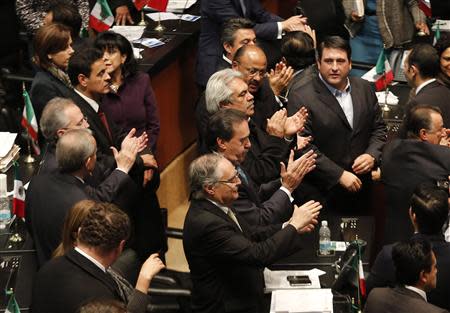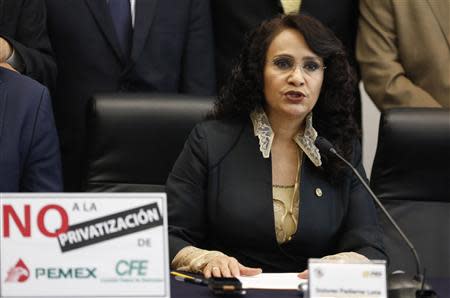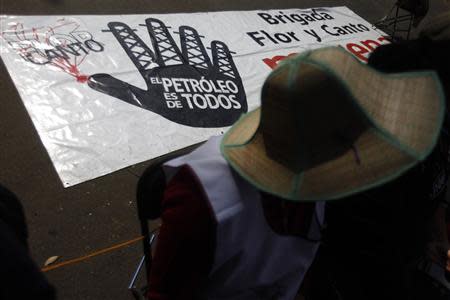Mexico's landmark energy bill nears final approval
By Miguel Gutierrez and Dave Graham MEXICO CITY (Reuters) - Mexico's Congress was on Thursday poised to complete approval of the biggest overhaul of its oil industry since nationalization 75 years ago, opening the door to investment by oil majors in a bid to reverse falling output. The energy bill is a cornerstone of an ambitious reform agenda spanning telecoms to bank lending that President Enrique Pena Nieto hopes will boost growth in Latin America's No. 2 economy, which for years has lagged regional peers. It aims to entice companies like Exxon Mobil Corp and BP Plc to operate independently in Mexico, or partner state oil giant Pemex through production- and profit-sharing, service contracts and licenses. Nevertheless, analysts say it will likely be years before such investments materialize and lift the economy. Lawmakers in the lower house gave general approval to the bill late on Wednesday, and then began an overnight debate of its details. Lawmakers expected final approval of the legislation, which has passed the Senate, later on Thursday. Leftist lawmakers fought bitterly against the bill, and some screamed "shame" and "traitors" as they denounced it in the general count. Some padlocked doors to the chamber on Wednesday in a bid to stop the debate, forcing lawmakers to switch venues to a smaller auditorium in the lower house complex. Dozens of leftist lawmakers lodged objections to the constitutional reform, which were being voted down one by one. Their stalling tactics have little chance of derailing the bill, which has the support of the ruling Institutional Revolutionary Party (PRI), their allies the Green Party, and the opposition conservative National Action Party (PAN). Speaking before the vote, Arturo Escobar, lower house leader of the Greens, attacked opponents of the reform, who are led by the leftist Party of the Democratic Revolution, or PRD. "I can't understand, and I say this with great respect, why the federal deputies and youth of the Mexican left keep defending such an out-of-date energy model," Escobar said. PAN congressman and energy expert Juan Bueno said "not even a comma" in the bill as approved by the Senate would be changed in the lower house. Once given final approval, the bill is then sent to Mexico's state legislatures for ratification. RICH POTENTIAL Mexico boasts Latin America's third-largest proven oil reserves after Venezuela and Brazil, at more than 10 billion barrels. It also has nearly 30 billion barrels of prospective resources in the country's deep waters of the Gulf of Mexico, an almost entirely untapped bounty for would-be producers. But Pemex's crude production has fallen by a quarter since hitting a peak of 3.4 million barrels per day in 2004, and export volumes have dropped by a third over the same period. Lawmakers amended the draft bill this week, adding a paragraph that removes union members from the board of Pemex, a demand of the PAN, which argues that the union is a weight around the company's neck and breeds corruption. When the revised bill was presented last Saturday, the content was a positive surprise for many in the oil industry. The government hopes it will power economic growth in Mexico, supporting the credit rating and the peso. The currency hit a 7-week high on Monday, but has since fallen back. The bill would allow private companies to operate the country's oil fields, which were nationalized in 1938. Though it stops short of opening the industry to full-blown concessions, it goes much further than many analysts had expected. Lawmakers say companies will not have rights to book oil reserves on their balance sheets but will be able to report projected benefits from agreed contracts for accounting purposes, which lawyers say is tantamount to the same thing. Other specialists say the proposal is vague on this point. The bill is a big departure from the service contracts now on offer, in which firms are paid a fee and can recover costs. It also goes well beyond the original proposal made by Pena Nieto in August, which was limited to profit-sharing contracts. PRD lawmakers hope to call for a binding referendum to overturn the energy bill. The lower house approved legislation on Tuesday setting out how the government has to carry out such referendums, but the measure must still pass the Senate. Jesus Zambrano, leader of the PRD, said the government faced a long fight over the bill and pledged to carry his opposition into the mid-term election year of 2015. (Additional reporting by Gabriel Stargardter, Ana Isabel Martinez, Tomas Sarmiento, Lizbeth Diaz, David Alire Garcia and Michael O'Boyle; Editing by Simon Gardner)






